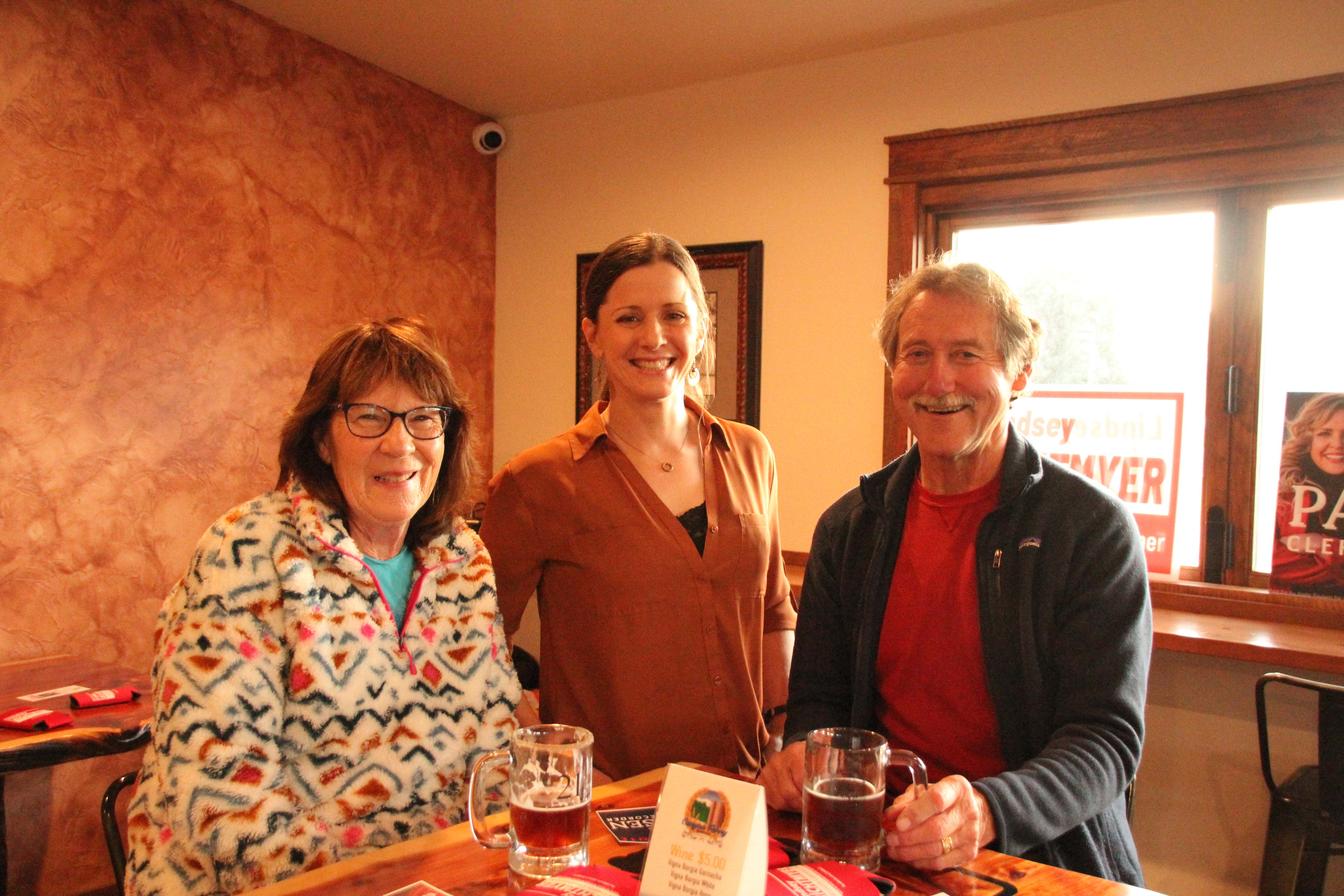2022 Candidate Forum
Author: Eliza McLaughlin - Staff Reporter
Laura and Rachael: This article is much longer than our GUIDELINES but in an election year this is an important article. I spoke with Nancy and we agree this needs to be published even though it is quite long. It can span pages. If you can reduce the size by editing some of the text that would be great but lets not make reducing the size of the article the main goal.
Broadwater County candidate forum brings out interested voters
STAFF REPORT
A good-sized crowd of interested voters gathered at the Fairgrounds 4-H building on the evening of Thursday, Oct. 27 to hear from several of the candidates listed on the Nov. 8 ballot. Approximately 50 persons showed up at the candidate forum despite the event’s short notice. Candidates who responded to the invitation to participate in the forum were Nick Rauser, Josh Peters, Julie Dooling, Jon Jackson, Lynsey Richtmyer, Mike Delger, Angie Paulsen, Chris Abbott and James Brown.
Rauser and Peters are vying for Broadwater County’s next Sheriff while Jackson hopes to take incumbent Dooling’s place as the Montana House District 70’s representative. Incumbent Delger also faces newcomer Richtmyer on the ballot. Brown, currently the Public Service Commission Chairman, is running for Montana Supreme Court Justice District #2 against incumbent Ingrid Gustafson. Gustafson was not present.
Paulsen is running unopposed for Clerk and Recorder while Abbott faces no competition in the race for District Judge. Both are listed as nonpartisan and have served in their respective positions for some time.
Neither Treasurer/Superintendent of Schools Melissa Franks nor Municipal Justice of the Peace candidate Kirk Flynn were present.
Middle School Principal Brad Racht moderated the forum, emphasizing a fair and non-contentious atmosphere during the event. “I believe that the open-minded sharing ideas is something that doesn’t occur nearly enough,” Racht said.
Before addressing the candidates, Racht read from the Voter Information Pamphlet notifying voters on information regarding Constitutional Amendment C-48, which bolsters unlawful search and seizure to apply to electronic data, and Legislative Referendum #131, which requires health care providers to perform life-saving medical care on born-alive infants.
Then came the candidates.
Each candidate received five minutes to introduce themselves and to “share their platform.” They then were asked two questions submitted by a committee, according to Racht. No questions were taken from the audience.
House District 70 Representative Julie Dooling was first to approach the podium for the HD 70 Representatives, laughing at the opportunity to have five uninterrupted minutes with a microphone as a politician. Dooling, a fourth generation Montanan, assumed her position as representative of House District 70 in January of 2019. Now in her second term, she’s seeking re-election on Nov. 8. During her time in office, Dooling said she has occupied the same three committees: state administration, transportation and agriculture, adding that between legislative sessions she served on the state administration and veterans’ affairs committee. It was on the SAVA committee that Dooling learned about and helped prepare several bills to address Montana’s underfunded pension programs. “Pensions are Montana’s largest liability,” she said, clarifying that pensions are in the billions of dollars. Dooling hopes to address the pension program with several bills during Montana’s 68th legislative session, which begins on Jan. 1. These bills include a request for $100 million to be added to the public safety pension plan for sheriffs, the Department of Corrections and game wardens.
A second bill will prohibit the addition of benefits into pension plans unless it amortizes in 30 years or less and is fully funded, Dooling said. “We do not want any more liability, especially in our pensions,” she explained. Although she finds pensions concerning, Dooling said she sees property taxes as “a huge thing to tackle” this session, expressing a personal connection to solving the rise in property taxes since both her mother and grandmother live on a fixed income.
Jon Jackson, also a fourth generation Montanan, shared his support for education, agriculture and the economy during the forum. Jackson served in Frankfurt, Germany for three years before returning to Montana to start a family and retired from the military after 39 years. Although Jackson has yet to serve in the legislature, he has participated in several community based organizations, including the American Legion, the Free Masons and Shriners.
Both candidates were asked the following question: “Montana’s income tax and property tax are a serious concern of Montanan’s. With the upcoming legislative session fast approaching, what is your position and approach on this issue?” Jackson was first to answer the question, explaining that these taxes are Montana’s major forms of income. “Any kind of issues that come up dealing with property or income taxes have to be faced straight ahead,” he said, adding that legislatures must understand the objectives and reasonings behind raising those taxes.
Dooling emphasized the need to reevaluate the property tax formula, clarifying that “very little” of those funds help finance state projects. Instead, much of the money gathered through property taxes return to communities to help funds school, fire departments and other local organizations. “We need to figure out how we’re going to fund these services, because we can’t rely so heavily on our property owners,” she said. “We have to figure out something else to tax.” Dooling went on to explain that income taxes were lowered during the last legislative session. Despite the cut, the state ended up with a $2 billion surplus, which Dooling credits to more people moving to and paying taxes in Montana with the combined addition of funds from the American Rescue Plan Act.
Both candidates then received a follow-up question: “What do you see as a priority issue for the legislature?” Dooling once again re-emphasized the need to handle property taxes and to reallocate the $2 billion surplus. She then explained that she’d like to help bring updated services to outdated departments.
Jackson said the economy was his main priority for the legislature while keeping children and agriculture, “the life blood of Montana”, in mind.
Broadwater County Commissioner Mike Delger has served as a Broadwater County Commissioner for six years, telling forum attendees that when he first joined the commission was “unhealthy.” Delger said since then, the commissioners have made headway reducing county debt. He also explained that the commissioners have developed a more efficient, and less stressful, method for creating the county’s budget.
Newcomer Lynsey Richtmyer said she brings a “unique perspective” to the Broadwater County Commissioners, having earned both a journalism and physical therapy degree. “I am not afraid to ask questions,” she said. Richtmyer said she hopes to find solutions to the county’s growth while working with private property owners to maintain agricultural land: “It’s happening whether we like it or not. People are moving here. If we go without a plan, it’s going to be a bit of a disaster.” Another goal Richtmyer has as a potential county commissioner is improving communication, with the possibility of a public information officer in the future, and accountability.
Both candidates were asked this question: “The city, county citizenry is in the process of going through an assessment process to identify priority issues to help guide the various government offices and supportive organizations. The official report has not been finished, but we can draw that unguided growth and development is a concern. As a county commissioner, how would you approach this issue?”
Richtmyer responded first, re-emphasizing the desire to work with private property owners and the possibility of using zoning “where appropriate.”
Delger said he didn’t oppose zoning; however, he only supported it in areas where the residents support it. “I think that it violates a person’s property,” he said. He went on to explain that developers are a concern in the county’s growth, since they will simply pay fines for violating building regulations. “I don’t know how you address uncontrolled growth, we control it as much as we can, but you cannot infringe on people’s property rights,” he said.
Both candidates were then asked a follow-up question: “Another identified issue is high-speed internet access. How can the commissioners increase the opportunity for our businesses and households to receive this service?”
Delger responded to the question first, explaining that while internet providers will service Winston to Toston, none want to service the east side of Canyon Ferry Lake.
Richtmyer agreed that Broadwater County was limited in its internet services. While grants are available, Richtmyer told listeners that it still has to be “optimal” for the providers. Increasing opportunities, she said, will require continued work with companies.
Broadwater County Sheriff Josh Peters and Nick Rauser have both entered their names for the Broadwater County Sheriff’s race.
Peters said his main goal as sheriff was to bring change and honesty to the department, emphasizing that there are “more sheriffs than deputies anymore.” Rauser currently possesses two titles in the Broadwater County Sheriff’s Department as captain and deputy coroner. Rauser said he learned to be a “more detailed cop” while serving for three years at the Jefferson County Sheriff’s Department. If elected, Rauser said he wants to create and maintain a healthy work environment in the department while helping protect both the north and sound end of the county. He also spoke on building relationships with children and the department.
Both candidates were asked the following question: “The sheriff’s office has received funding from the special mills for improved law enforcement coverage county wide, and the detention center. Is the sheriff’s office adequately financed?”
Rauser said the department is currently financed and thanked voters for passing the special mill levy as it allowed the department to house more inmates to keep them off the street.
Peters said he couldn’t answer the question since he didn’t work in the department. “Without working there and knowing what they purchase and anything else, I wouldn’t have a clue on how much financing they need,” he said.
Both candidates were then asked a follow-up question: “With the seemingly huge increase of homes and businesses in the Wheatland area and the currently negotiated Townsend contract, please explain how you plan to address the needed law enforcement coverages.”
Peters said he couldn’t answer the question since he didn’t know the what the contract entailed.
Rauser responded with the potential of securing another COPS grant to help hire deputies to cover the south-end of the county, adding that he’d like to arrange for a school resource officer as well.
However, the bigger problem was retention Rauser said: “Law enforcement is a revolving door.”
The Forum concluded with Racht reading letters from Cory Swanson and Sam Rankin. Neither were able to attend the event.
Tim Poole told MT 43 News that the 2022 Broadwater County Candidate Forum came to be after a group of concerned citizens learned that the Cattlewomen would not be hosting the event like they had in years past.
With only a week before their desired date, this group of citizens put their boots to the ground and put together the event, which went on without a hitch.
Sponsors of the forum included Broadwater County News, Jeannie Steele Real Estate, Creative Closet and Sawdust and Threads.
Jeannie Steele told MT 43 News that she chose to help sponsor the forum with the intent to help inform voters: “I think it is so important that voters know who they are voting for, and for voters to get out and vote.”
Article Images
Click on Image Thumbnail(s) to view fullsize image

